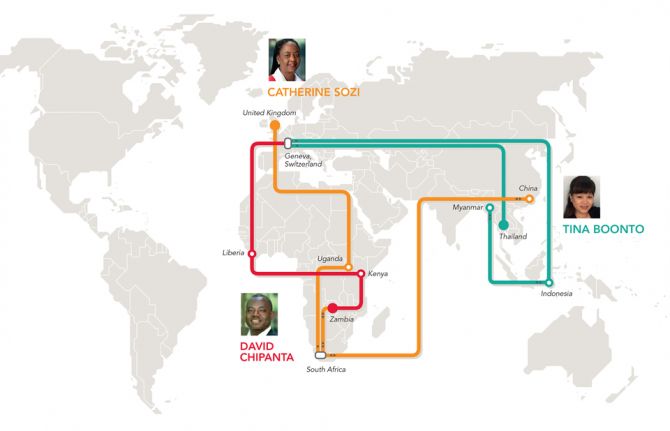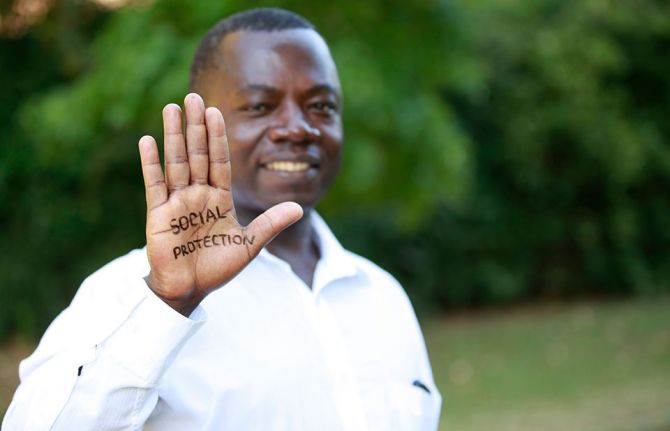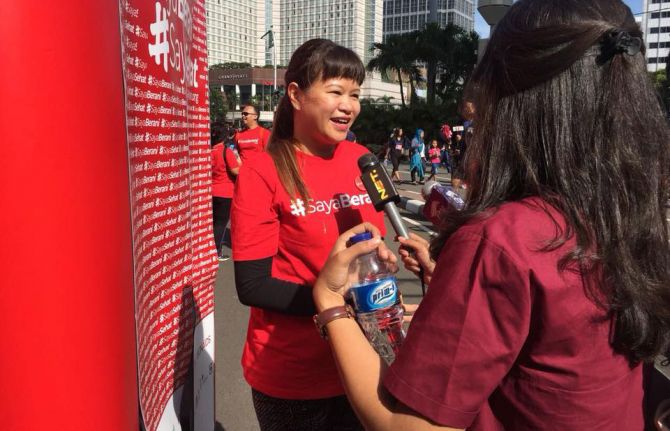




Feature Story
Bringing about change
25 April 2018
25 April 2018 25 April 2018David Chipanta started his UNAIDS career in Liberia as the UNAIDS Country Director, where he helped to strengthen the national AIDS commission and national strategy framework. He is particularly proud of putting gender and ending sexual violence front and centre in the AIDS response in the country and giving the national network of people living with HIV more of a voice.
“What I found exciting was tackling the many barriers that surround access to HIV treatment, prevention, care and support,” he said. By barriers, he means the stigma, discrimination, poverty and inequalities that constrain people from accessing HIV services.
An economist by training, Mr Chipanta remarked, “We cannot forget the importance of all the things that relate to people’s lives—do they feel secure, do they have food, do they have a house, a family, a job?” Giving the example of Zambia, he described some people only taking their HIV medicine during the rainy season because food is more readily available then.
“It hit me that the peripheral stuff is very important, because without it HIV services will have a limited impact,” Mr Chipanta said. His current job as the UNAIDS Social Protection Senior Adviser in Geneva, Switzerland, focuses on just that—connecting people affected by HIV to social safety nets and improving livelihoods, as well as reducing poverty and improving education.
“UNAIDS has created more awareness about social protection services and the hurdles that people living with HIV face,” he said. For example, he explained that in Liberia and Sierra Leone, sex workers said they weren’t accessing social protection services because the administrators often treated them badly; in response, his office set up sensitivity training.
Another issue close to his heart is girls’ education. Keeping girls in school has been shown to lower HIV prevalence and is an important factor in increasing access to HIV treatment. “In low-income settings, we shone the light on the importance of cash transfers to keep girls in school,” Mr Chipanta said. His next challenge is advocating for more synergies with programmes for mentoring, empowerment and social support.
“As a person living with HIV, I never thought I would accomplish so much,” he said. In 1991, when he found out his HIV status in his native Zambia, he assumed that his life was over. “I thought, before I die, let me help others,” he added.
“I was personally motivated to work in the HIV field,” he said. “But I felt like I wanted to become an expert in my own right.”
Krittayawan (Tina) Boonto reflected on her 20 years at UNAIDS by also saying she couldn’t believe how far she had got. Ms Boonto started work in her native Thailand before moving to Geneva.
“It was supposed to be temporary, but I stayed seven years,” she said.
She then went to Indonesia as the Programme Coordination Adviser in 2005. She helped the Ministry of Health with technical support and accessing financial resources from the Global Fund to Fight AIDS, Tuberculosis and Malaria. That experience proved pertinent, because in 2010 she moved to Myanmar as the Senior Investment and Efficiency Adviser.
“The country was opening up at that time, so my field experience in other countries came in handy,” she said. For example, UNAIDS advocated to decentralize the provision of antiretroviral medicines so that people from rural areas could get their treatment at primary health-care centres without traveling to the main cities.
“It was so rewarding to be on the ground and witness the change.” According to Ms Boonto, antiretroviral medicine access shot up to more than 120 000 people accessing the medicines, up from 30 000 people in three years.
“That’s when I realized that it’s not just about money, it’s also about the willingness to change,” she said.
A year ago, she returned to Indonesia, but this time as the UNAIDS Country Director. It’s been challenging for her because despite the scale-up when she was in the country the first time, Indonesia lags behind its neighbours, such as Thailand and Myanmar, in terms of antiretroviral medicine access and reducing new HIV infections. “It ranks third after India and China in the region in terms of new HIV infections,” Ms Boonto said.
Her tactic has been to raise HIV awareness among decision-makers and stress to them that the epidemic is not under control. “We present data and push to keep HIV a priority,” she said. Recently, she has been knocking on doors to raise alarm bells about tuberculosis—a disease that remains one of the leading causes of death among people living with HIV, despite being treatable and preventable.
“It all boils down to political will and getting the autonomous country districts on board once the Ministry of Health approves,” she said. Not flinching, Ms Boonto said, “My job never lets me forget what I am working for: people living with HIV.” She added, “We are still relevant and are still much needed, and that is the greatest satisfaction of all.”
Satisfaction for Catherine Sozi has been observing the shift from, “How can we roll out treatment for so many people, to getting 21 million people on treatment in the space of 10 plus years,” she said. In her third stint in South Africa, she feels UNAIDS’ advocacy work has paid off. Recalling a conversation she had in Zambia with the government when she worked there 15 years ago, many feared that the money and support would not come if countries started to offer antiretroviral medicines. “I made the case that money would come based on the countries’ growing commitment and that we would work to get the prices down,” she said. In 2005, prices for antiretroviral medicines were high. “The governments listened to us and to civil society and, based on solid results in 2015, it suddenly looked feasible to put an end to AIDS,” Ms Sozi said.
As the Regional Director for the eastern and southern Africa region, she is thrilled by the positive energy in the region, despite the many challenges remaining. “A lot still needs to be done to stop new HIV infections, get even more people on treatment and have them stay on treatment, and that includes testing even more adolescents, children and adults for HIV, including key populations,” she said. Another big issue involves tackling rampant sexual violence, which leads in part to higher numbers of new HIV infections among girls and young women, she explained.
“In this case, a biomedical response won’t help. We need to change how we relate to households, the police and the legal system and get faith leaders, women activists, nongovernmental organizations and men involved to turn things around,” Ms Sozi said. Trained as a doctor in Uganda, she admits that her career has propelled her into a much wider arena than she had ever anticipated.
“The UNAIDS women’s leadership programme empowered me to become a leader and reassured me that I could manage a large, diverse staff as well as resources and still be technically strong,” she said.
Her four years as the UNAIDS Country Director in China, before her latest move to South Africa, proved to be very enriching on a personal and professional level. “As a family we had a wonderful time in a country that is in itself so diverse in all aspects,” she said. The commitment by the government and civil society to work on the epidemic was both invigorating and challenging.
One of her biggest accomplishments in Asia was her contribution to the China–Africa health dialogue. “For me, to support the South–South dialogue on China–Africa health cooperation meant a lot,” Ms Sozi said. “I see myself as a facilitator of change.”
MORE IN THIS SERIES
UNAIDS staff share global experience on AIDS through criss-crossing the world
It’s about the people we serve: UNAIDS staff connecting the world



